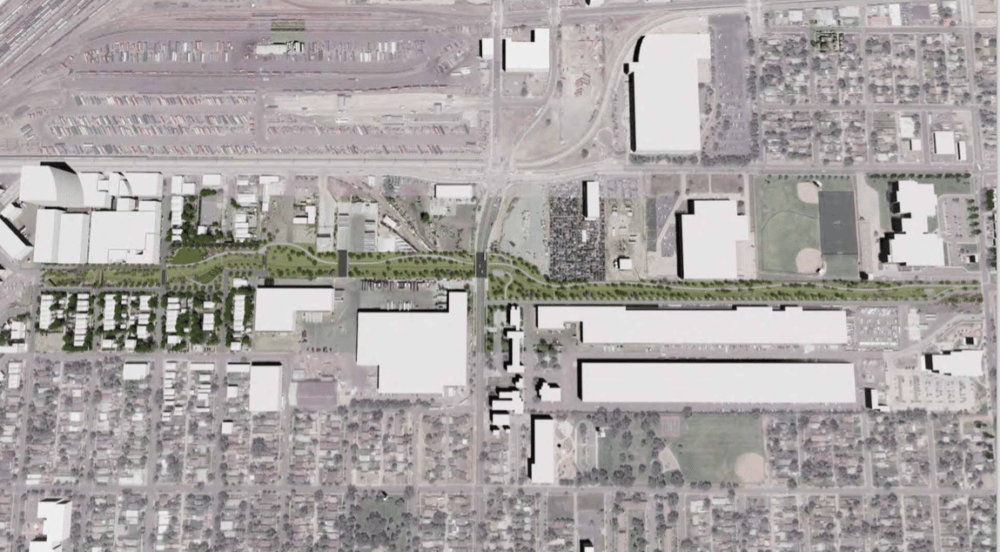Is it a park? Is it an extremely elaborate drainage ditch? Starting in 2020, you'll be able to judge for yourself.
The city of Denver is preparing to sign a major contract for the construction of a $57 million, mile-long project through the Cole and Clayton neighborhoods.
Known as the 39th Avenue Greenway, it will be an “open channel” — basically a low, grassy area that will wind along from Steele Street west to Franklin Street, near where 39th Avenue would be.
City staff say it's a key part of an elaborate new system of flood controls. It has faced criticism both for the concept and for its role in the larger system of new infrastructure being built in North Denver -- but we'll get to that in a bit.
Here's a fancy rendering.
As you can see, the channel will be a recreational area with a bicycle path, lighting and trees along with plazas and play areas. The project also will include pedestrian and road bridges.
Danielle Ongart, president of the Clayton United neighborhood group, said that her neighbors were excited to see a dark and dusty stretch of land replaced with something more pleasant.
"As long as those promises can be made good on, then folks are generally excited about the prospect of reactivating that area in a way that it can be used," she said in an interview.
Construction also will require the purchase and demolition of some homes in the Cole neighborhood.

What it does:
It's not just a nice greenway, though. It's actually part of the larger
"Platte to Park Hill" system of pipes and ponds. During heavy storms, flood water would flow through the channel, eventually reaching a pipe to the South Platte River.
In other words, the channel would reroute the flood waters. Instead of washing over low-lying areas -- including the National Western Center and the Interstate 70 corridor -- it would go straight to the river. The National Western and I-70 re-builds are both pretty controversial.
(We had a big story on this overall project back in May. It was pretty interesting, according to me.)
The idea has faced some questions:
Critics also have asked whether construction of the channel would turn up any contaminants in the soil, especially since it crosses a Superfund site.
Nancy Kuhn, the communications director for Denver Public Works, said that the construction team would test for and counter any environmental threats from construction. Testing shows the "majority" of the project "falls below the levels of concern established by (the Environmental Protection Agency)," according to a city presentation.
Another point of concern: What happens when it floods? City staff have said that people will have plenty of time and warning to get out of the low-lying area in the event of a flood.
City staff compared the channel to the Cherry Creek Trail, which can be submerged in heavy flood events.
"It would be a similar process. That seemed to make folks feel better," Ongart said.
Overall, she said, "the project has been a lot less controversial, at least in our general neighborhood consciousness, than some of the other projects around us."
What's next?
City staff have recommended that SEMA Construction get the overall contract. They potentially would work with Felsburg Holt & Ullevig, DHM Design and ECI Site Construction.
That contract would include construction of a stormwater area at Park Hill Golf Club, which is a whole other fascinating and very complicated thing.
The design of both the channel and the detention area are expected to be done in 2018, with construction running through 2019. The channel will cost about $57 million and the Park Hill project will be about $22 million.
A Denver City Council committee approved the choice on Tuesday, but it still has to go before the full council.












